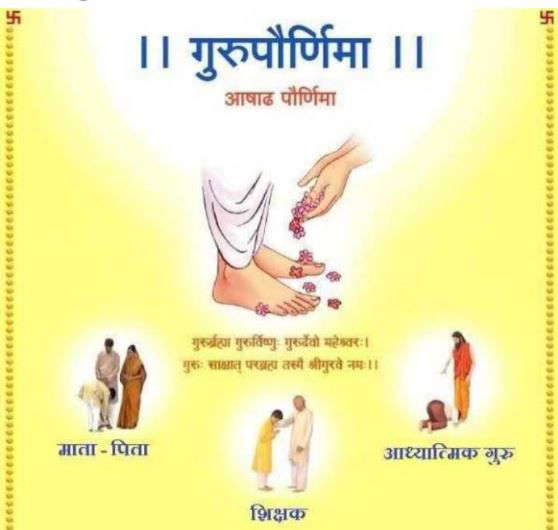Gurupurnima, 8th Tude & Success in Foreign Lands


Today Hindu diaspora communities are in virtually every part of the world. Hindus are in South Africa and East Africa, in Trinidad and Mauritius, in Australia and Austria, in the United Kingdom and in the United States. Hindus are however closely identified with India, where more than 95 percent of the world’s Hindus live.
They celebrate and continue their festivals (culture) everywhere. On July 24, 2021, I received a Gurupurnima greetings from a (former) student of mine from a far off place with picture, as is our head photo.
I was thrilled and also compelled to think through three very significant questions, as follows:
Gurupurnima is a day (as per Hindu Calendar that normally falls in the month of July) earmarked since ages to offer respect to our Gurus (teachers). Gurus in Hindu culture may be any (and many) who teaches you and helps you (attain knowledge, skills and attitude- develops you world-wise and spiritually) to live a better life.
Gurupurnima is celebrated on a full moon day. It is a symbol that Guru is one who provided you light. He or she guides you from darkness (ignorance) to light (knowledge).
The role of Guru is acknowledged no less than parents. Parents give you biological birth (bring to this world); Guru gives you knowledge, skills and attitude (KSA) to live in this world successfully.
As per Hindu culture, a child takes a family name (jati at birth) from parents and Guru name (gotra after completion of education) from Guru. In modern day, Guru name is your alma mater.
In olden days in Bharat (India), Gurus used to be head of Gurukula (school), and their students used to get the name of the Guru (Gurukula). Today, we live in the world of mass production. In the matter of education, we have big Universities. We still proudly say we are alumnus of such and such University. That is the ‘gotra’ of Hindu Culture.
In Hindu culture, marriage was prohibited between children of the same parents and students of the same Guru. The beauty of Hindu Culture is that it is flexible. It evolves. In the modern day, marriage between same gotra (by birth) persons is approved (after all lots of love marriages od modern day start from the same school or college days).
To know 7 Tudes see a book, ’Does Your Company Have What It Takes to Go Global’ by Douglas Quackenbos and others (2016) or a YouTube video, ‘Separating Winners & Losers with Seven ’Tudes.
The seven ‘tudes’ described in the above book are as follows:
ATTITUDE: What priority does your company or division place on international business expansion?
APTITUDE: Does your company have the right experiential resources to succeed?
MAGNITUDE :Do your company’s goals and capabilities align with the target market opportunity?
LATITUDE :Is your company willing to adapt to the new ways of doing business?
RECTITUDE :Will your company’s legal and ethical standards allow for success in the local environment?
EXACTITUDE: Does the company’s corporate culture for overseas initiatives accept ambiguity/risk in “the numbers”?
FORTITUDE: Is the company willing to persevere when the “going gets tough?”
How about GRATITUDE?
That is what authors of the above book missed out. Gratitude and thankfulness bring you continued guidance and support. In English speaking world also, ‘Please’ and ‘Thank you’ are stated to be two magic words.
In the Hindu culture, Gurupurnima is the day of expressing your gratitude to Gurus (Teachers) and parents.
Indeed, in the modern corporate structure, your immediate boss is the best teacher in corporate world, and you should be grateful and thankful to him/ her to get more, better and continued guidance.
Hindus are successful in any country they go. The evidence is that they hold top positions in political, business, education, legal, administration and social circles in any country they have migrated to. It is all the more credible, as earlier generations of Hindus were migrated as indentured labor.
I have personal experience working in Gulf Coordination Council Countries. These are Islamic counties. But I have experienced preference for Hindus there. They often say that Hindus are ‘Maskeen’. Muskeen entrails from musk deer. Hindus have a fragrance like musk deer, meaning humble, quiet, peaceful, high work ethics.
They are humble. They are thankful. They learn gratitude as part of their culture. Gratitude should not be confused with lack of assertiveness. They are politely firm. The evidence is 1.1 billion Hindus of the total 7.8 billion population of the world today, despite continued conversion efforts, both, by sword and money.
People sometime wonder why Hindus are not so successful in India as they are abroad. There the entire blame lies at the door of corrupt and divisive political system that has continued even after Independence in 1947.
Could you believe that a Hindu folk singer’s recording at national television studio was stopped because she sang a folk that said Rama was born in Awadh (Ayodhya). That is the story of 2005. Congress Party was in rule then. To know more, you may please google, interview of Padam Shri Malini Awasthi with News Nation.
Anyone researching Congress Party Rule in India would find glaring discrimination and mistreatment given to Hindus in India in the name of Secularism. That may be for another time. The worst is Congress Party continuing to posit itself for the last 100 years or so, as a political party representative of Hindus and led by Hindus.
DISCLAIMER: The author is solely responsible for the views expressed in this article. The author carries the responsibility for citing and/or licensing of images utilized within the text.
